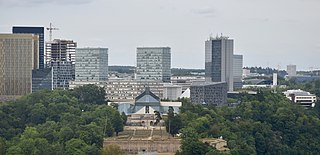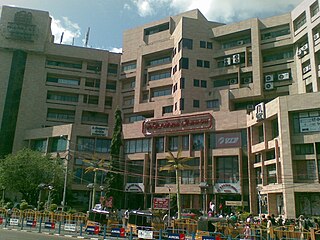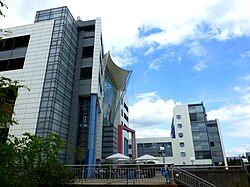
CF Toronto Eaton Centre, commonly referred to simply as Eaton Centre, is a shopping mall and office complex in the downtown core of Toronto, Ontario, Canada. It is owned and managed by Cadillac Fairview (CF). It was named after the Eaton's department store chain that once anchored it before the chain went defunct in the late 1990s.

Araneta City, formerly and still commonly known as Araneta Center, is a 35-hectare (86-acre) transit oriented, commercial mixed-use urban development in Quezon City, Philippines. Situated in Barangay Socorro in Cubao, and at the intersection of two major roads, Epifanio de los Santos Avenue (EDSA) and Aurora Boulevard, the area offers retail, dining, entertainment, residential, office, lodging and parking facilities throughout the complex and hosts over 1 million people daily, due to its close proximity to transport terminals, including the railway stations of the MRT Line 3 and the LRT Line 2.

Eurostat is a Directorate-General of the European Commission located in the Kirchberg quarter of Luxembourg City, Luxembourg. Eurostat's main responsibilities are to provide statistical information to the institutions of the European Union (EU) and to promote the harmonisation of statistical methods across its member states and candidates for accession as well as EFTA countries. The organisations in the different countries that cooperate with Eurostat are summarised under the concept of the European Statistical System.

Kirchberg is a quarter in north-eastern Luxembourg City, in southern Luxembourg. It consists of a plateau overlooking the north-east of the historical city center, Ville Haute, connected to the rest of the elevated city by the Grand Duchess Charlotte Bridge, which spans the Pfaffenthal valley. It is often referred to, in reference to the geographical feature it inhabits, as the Kirchberg plateau by Luxembourgish residents. Kirchberg is the predominant location of the European Union institutions and bodies based within Luxembourg, and is sometimes used as a metonym for the EU's judiciary, which occupies the quarter. It is thus the central business district of Luxembourg.

The European School, Luxembourg I (ESL1) was the first of the European Schools. It was founded in October 1953 on the initiative of officials of the European Coal and Steel Community, with the support of the Community's institutions and the government of Luxembourg. In April 1957, it formally became the first of the European Schools. Today it is located on the Kirchberg-Plateau in Luxembourg City.

Sandton City is a large shopping centre situated in Sandton, Johannesburg, South Africa. It was built and owned by property development company Rapp and Maister, in partnership with brothers Hilliard and Eli Leibowitz, and was later taken over by Liberty Life.

Spencer Plaza is a shopping mall located on Anna Salai in Chennai, Tamil Nadu, India, and is one of the modern landmarks of the city. Originally built during the period of the British Raj and reconstructed in 1985 on the site of the original Spencer's department store, it is the oldest shopping mall in India and was one of the biggest shopping malls in South Asia when it was built. It is one of the earliest Grade A commercial projects of the city, which were developed in the second half of the 1990s. As of March 2010, it is the 11th largest mall in the country, with a gross leasable (retail) area of 530,000 sq ft.

Auchan is a French multinational retail group headquartered in Croix, France. It was founded in 1961 by Gérard Mulliez and is owned by the Mulliez family, who has 95% stake in the company. With 354,851 employees, of which 261,000 have 5% stake in the company, it is the 35th largest employer in the world.

Parkway Parade is a suburban shopping centre in Marine Parade, Singapore. Officially opened in March 1984, it has a 22-floor office tower and a seven-storey shopping mall with a basement. Developed by Parkway Holdings, the company sold the building to Asia Pacific Investment Company in 2000. The mall is managed by Lendlease.

Raffles City is a large complex located in the Civic District within the Downtown Core of the city-state of Singapore. Occupying an entire city block bounded by Stamford Road, Beach Road, Bras Basah Road and North Bridge Road, it houses two hotels and an office tower over a podium which contains a shopping complex and a convention centre. The mall is managed by CapitaCommercial Trust and CapitaMall Trust. It was completed in 1986.

The National Sports and Culture Centre d'Coque(French: Centre National Sportif et Culturel d'Coque), better known simply as d'Coque, is a sporting and cultural venue with an indoor arena and Olympic-sized swimming pool, amongst other facilities, in Kirchberg, a quarter of Luxembourg City, in Luxembourg. More recently it has expanded into providing onsite hotel services, and acting as a conference venue.

The Meridian Mall is a large shopping complex in Dunedin, New Zealand designed by ASA Crone Architects, an Australian development company. At 16,000 m2 (172,222.6 sq ft) it is the largest retail mall in the southern South Island, and one of the largest in the South Island as a whole.

Iulius Town Timișoara is the name of a mixed-use development, edge city and shopping mall located in Timișoara, Romania. Owned by the Iulius Group–Atterbury Europe consortium, the project was conceived from the beginning to integrate Iulius Mall, now completed with office, retail and entertainment functions. The mixed project includes, in addition to the shopping area, a park, event rooms, offices, a health center, a cinema and over 4,000 parking spaces. Over 442 million euros were invested in the first phase of the project, partially inaugurated in August 2019, being one of the largest infusions of private capital in the real estate sector ever made in Romania. The estimated annual traffic for Iulius Town is over 20 million visitors.
Bucharest is the most economically developed and industrialised city in Romania, producing around 21% of the country's GDP and about one-quarter of its industrial production, while only accounting for 9% of the country's population. Almost one third of national taxes is paid by Bucharest's citizens and companies. In 2009, at purchasing power parity, Bucharest had a per-capita GDP of €26,100, or 111% that of the European Union average and more than twice the Romanian average. The city's strong economic growth has revitalised infrastructure and led to the development of many shopping malls and modern residential towers and high-rise office buildings. In September 2005, Bucharest had an unemployment rate of 2.6%, significantly lower than the national unemployment rate of 5.7%.

Tourism is an important component of the national economy of Luxembourg, representing about 8.3% of GDP in 2009 and employing some 25,000 people or 11.7% of the working population. Despite the 2008–2012 global recession, the Grand Duchy still welcomes over 900,000 visitors a year who spend an average of 2.5 nights in hotels, hostels or on camping sites. Business travel is flourishing representing 44% of overnight stays in the country and 60% in the capital, up 11% and 25% between 2009 and 2010. Published by the World Economic Forum in March 2011, the Travel and Tourism Competitiveness Report puts Luxembourg in 15th place worldwide, up from 23rd place in 2009.

Livat Hammersmith, formerly known as the Kings Mall, is a retail, residential and office complex located off King Street in Hammersmith in the London Borough of Hammersmith and Fulham. Along with the other Livat Centres, it is operated by the Ingka Centres division of INGKA Holding.

The Jean Monnet 2 building is a future office complex for the European Commission under construction on Boulevard Konrad Adenauer in the European district of the Luxembourg City quarter of Kirchberg, Luxembourg. The complex is to be composed of a welcome pavilion and two office buildings to be completed in two phases respectively; an 8-storey 180 metre (m) long block and a 24-storey tower, connected at the basement and second storey levels. The first phase was expected to be completed by late February 2023, and the second phase by late February 2024. This timetable has been pushed back due to the global COVID-19 pandemic. The first Jean Monnet building, opened in 1975, was demolished between 2016 and 2019, after exceeding its lifespan, and following the discovery of airborne traces of asbestos. The construction site combines some of the plot of the previous building with an adjacent former open air car park. Upon completion, the Jean Monnet 2 building will enable the European Commission to consolidate the majority of its Luxembourg-based staff on one site. Like its predecessor, the building's namesake is European Union (EU) founding father Jean Monnet.
The Euroforum building is an office complex used by the European Commission in Cloche d'Or, Gasperich, Luxembourg City, Luxembourg. It hosts, amongst other European Commission departments, the Euratom Supply Agency.

The Palais de la Cour de Justice is a building complex acting as the seat of the Court of Justice of the European Union (CJEU), located in the European district of the Luxembourg City quarter of Kirchberg. Today the Palais complex encompasses the original 1973 building, now known as the Ancien Palais, which houses the court rooms of the CJEU's Court of Justice, the Anneau building, encircling the Ancien Palais, which contains the judges chambers and deliberative rooms, the three tower buildings containing the CJEU's translation services, and the Gallery building, containing the CJEU's legal library and linking all the structures of the Palais complex with the renovated three annexes originally constructed between 1978 and 1994 that now host the court rooms of the CJEU's General Court.



















